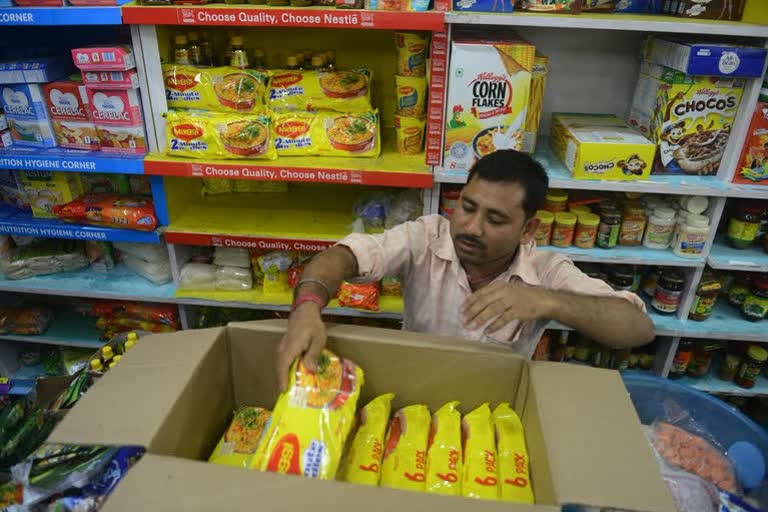New Delhi: The transformation of just 10 per cent of the 13 million kirana stores (traditional grocery retailers) in the country could boost the retail consumption by more than 5 per cent and generate about 3.2 million new jobs, a report said on Thursday.
The Accenture-Trust For Retailers and Retail Associates of India (TRRAIN) report outlined a strategic approach for unlocking value by transforming kirana stores through a seven-stage framework.
These include factors like store location and layout, technology, store funding, and product placement, the report titled 'Transforming Kirana Stores to Drive Economic Growth' said.
"The rapid changes in consumer behaviour and acceleration of online commerce, mandate that the Indian retail ecosystem transforms to meet (the) emerging consumer needs," Accenture India Market Unit lead Piyush N Singh said.
As the lifeline of the Indian retail sector, a digital-led transformation of kirana stores can result in significant economic gains, including a nearly 1 per cent employment growth in India, he added.
The transformation process needs to be expedited with comprehensive policy intervention, technology support, and most importantly, collaboration between key ecosystem players, Singh said.
The report pointed out that as of 2019, only 12 per cent of the country's retail trade is organised or modern, and the rest is supported by small traders, retailers, and kirana store owners. In the food and grocery segment, more than 95 per cent of the business is in the hands of traditional retailers.
By 2021, it is expected that the share of trade managed by the 13 million kirana stores will reduce to 75 per cent of the total retail industry from the current level of 88 per cent, it said.
This ongoing disruption in traditional trade needs to be mitigated through the modernisation of kirana stores, it added.
Sameer Amte, a managing director in Accenture's Strategy and Consulting business in India, said with an improved, intelligent supply chain infrastructure and easier access to technology and funds, these stores can redefine the future of the Indian retail landscape.
Out of the 13 million traditional grocery stores in India, the transformation of an estimated 1.4 million stores (large and medium size stores) could expand the formal economy by approximately 250 per cent with computerised billing and ledger systems.
This would also enable the government to have a better visibility and traceability into what was previously the 'informal' economy, it said.
Also, there is an average 50 per cent growth in employment in the stores that are modernised. Overall, the transformation of 1.4 million stores can generate 3.2 million new jobs in the market and the industry can support low-skilled jobs at mass scale, it added.
The report said fast-moving consumer goods should implement innovative retailing techniques such as kirana-specific merchandising, customised programmes for product trials and assortment.
Also, e-commerce and cash-and-carry retailers can leverage kirana stores for last-mile delivery in remote places and in turn support them with digital technology such as digital payment solutions at the point of sale, while intermediary players such as wholesalers and logistics providers need to modernise to fulfill the needs of the transformed retail ecosystem.
Retail associations and non-governmental organisations (NGOs) should support the education and skill-building of kirana store owners and collaborate with government bodies to facilitate the modernization process at scale, the report recommended.
Government can enable transformation with policy change to stimulate growth in consumption, gross domestic product (GDP), tax contribution and employment, also providing the impetus for other stakeholders to play their part, it added.
The report said location assessment is important as it is essential to identify the customer profiles, demographic and social parameters, income class and external drivers such as competitors.
Also, in-store capital expenditures and the cost of the space should be kept in mind. It suggested that if the store is rented, the rent should not be more than 3 per cent of sales or one-fifth of the gross profit, whichever is higher.
The store layout influences the customer's perception of the store and ideally, 75 per cent of the space should be devoted to sales, 10 per cent to office space and 15 per cent to storage, it added.
The report noted that product placement practices can be improved by classifying products inside the store into three categories: destination, convenience and impulse.
Customer engagement can be improved with promotional activities and discount offers, it suggested.
Besides, technology modernisation requires a fully integrated retail enterprise resource planning software solution and a point-of-sale machine, along with digital wallets registration.
"India is a nation of shopkeepers, and kirana stores play a crucial role in the Indian retail sector, which in turn contributes nearly 11 per cent of the nation's gross domestic product and 8 per cent of its total workforce. Kirana transformation will not only help store owners improve profitability but also add value to the customers and overall ecosystem," BS Nagesh, founder of TRRAIN, said.
This report puts the spotlight on the pivotal role of the kirana stores in the community and the impact of their transformation not just on them and the industry, but also on India as a whole, Nagesh added.
(PTI)
Read more:Market tumbles for 5th straight session; Sensex tanks 536 pts
